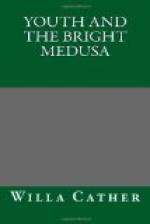* * * * *
Everett’s week in Cheyenne stretched to three, and he saw no prospect of release except through the thing he dreaded. The bright, windy days of the Wyoming autumn passed swiftly. Letters and telegrams came urging him to hasten his trip to the coast, but he resolutely postponed his business engagements. The mornings he spent on one of Charley Gaylord’s ponies, or fishing in the mountains. In the afternoon he was usually at his post of duty. Destiny, he reflected, seems to have very positive notions about the sort of parts we are fitted to play. The scene changes and the compensation varies, but in the end we usually find that we have played the same class of business from first to last. Everett had been a stop-gap all his life. He remembered going through a looking-glass labyrinth when he was a boy, and trying gallery after gallery, only at every turn to bump his nose against his own face—which, indeed, was not his own, but his brother’s. No matter what his mission, east or west, by land or sea, he was sure to find himself employed in his brother’s business, one of the tributary lives which helped to swell the shining current of Adriance Hilgarde’s. It was not the first time that his duty had been to comfort, as best he could, one of the broken things his brother’s imperious speed had cast aside and forgotten. He made no attempt to analyse the situation or to state it in exact terms; but he accepted it as a commission from his brother to help this woman to die. Day by day he felt her need for him grow more acute and positive; and day by day he felt that in his peculiar relation to her, his own individuality played a smaller part. His power to minister to her comfort lay solely in his link with his brother’s life. He knew that she sat by him always watching for some trick of gesture, some familiar play of expression, some illusion of light and shadow, in which he should seem wholly Adriance. He knew that she lived upon this, and that in the exhaustion which followed this turmoil of her dying senses, she slept deep and sweet, and dreamed of youth and art and days in a certain old Florentine garden, and not of bitterness and death.
A few days after his first meeting with Katharine Gaylord, he had cabled his brother to write her. He merely said that she was mortally ill; he could depend on Adriance to say the right thing—that was a part of his gift. Adriance always said not only the right thing, but the opportune, graceful, exquisite thing. He caught the lyric essence of the moment, the poetic suggestion of every situation. Moreover, he usually did the right thing,—except, when he did very cruel things—bent upon making people happy when their existence touched his, just as he insisted that his material environment should be beautiful; lavishing upon those near him all the warmth and radiance of his rich nature, all the homage of the poet and troubadour, and, when they were no longer near, forgetting—for that also was a part of Adriance’s gift.




